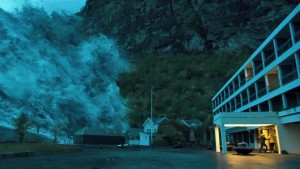![]()
While most European movies that receive a theatrical release in North America tend to be artful and introspective, make no mistake… audiences there are just as interested in popcorn fare. The Wave is simply a Norwegian take on the Hollywood disaster film. It was also a massive box office success in its homeland. Truthfully, this story could have done with a few more alterations to make it more unique and authentic. However, it works well enough as a genre picture and travelogue to earn it a modest recommendation.
 Kristian (Kristoffer Joner) is a geologist working his final day in the resort village of Geiranger, Norway. Located at the end of a sea waterway and surrounded by massive mountains on all sides, our work-obsessed hero raises concern that a large rockslide is imminent. Of course, such an event could cause a tsunami and wipe out the entire community. While he packs, takes care of his two children and tries to convince his unimpressed co-workers of the scientific evidence, his wife Idun (Ane Dahl Torp) finishes off her last shift at a local hotel. They’ll all wish they had left town a day earlier.
Kristian (Kristoffer Joner) is a geologist working his final day in the resort village of Geiranger, Norway. Located at the end of a sea waterway and surrounded by massive mountains on all sides, our work-obsessed hero raises concern that a large rockslide is imminent. Of course, such an event could cause a tsunami and wipe out the entire community. While he packs, takes care of his two children and tries to convince his unimpressed co-workers of the scientific evidence, his wife Idun (Ane Dahl Torp) finishes off her last shift at a local hotel. They’ll all wish they had left town a day earlier.
Not to give anything away, but a major disaster does occur. We’ve seen most of this before; several disaster genre beats and themes are repeated. There’s the scientist who warns of the impending problem, but whom no one takes seriously (of course, the biggest skeptic in the group pays for their ignorance). It features a family that won’t give up on their quest to be reunited with each other. And there are scenes of heroism and sacrifice, whereby one character attempts to help another and pays the ultimate price for their selflessness. Finally, there are others (mostly extras) who make poor choices and are quickly punished for it.
 At least the movie is well-made and acted. Although supporting characters pop up here and there, the filmmakers focus all their attention on the four family members. There’s a little more character development to the lead character. It’s far better than the norm of introducing dozens of broadly drawn archetypes and only giving them a scene or two before tragedy strikes. The movie also has some impressive visuals, and not just in the tidal wave sequences or other impressively staged moments of mass destruction. There are plenty of aerial shots of the village and mountains that are striking. It’s an absolutely beautiful location.
At least the movie is well-made and acted. Although supporting characters pop up here and there, the filmmakers focus all their attention on the four family members. There’s a little more character development to the lead character. It’s far better than the norm of introducing dozens of broadly drawn archetypes and only giving them a scene or two before tragedy strikes. The movie also has some impressive visuals, and not just in the tidal wave sequences or other impressively staged moments of mass destruction. There are plenty of aerial shots of the village and mountains that are striking. It’s an absolutely beautiful location.
Finally, there is one other unique event that comes up amidst the typical disaster movie tropes; a panic-stricken survivor begins endangering the lives of family members in a tense scene and one of the characters must decide whether or not to spare them. It’s an interesting, potentially ugly moment that you wouldn’t see in typical Hollywood fare. In fact, one wishes there were more uncomfortable (and believable) situations with tough decisions for the characters.
It’s a bit of a surprise that Norway chose this film to be their submission for a foreign-language Academy Award. The story doesn’t offer any deep meaning, nor does it vary enough from the traditional disaster movie formula to surprise or feel all that award worthy. However, it isn’t as laughable as some of the genre’s more recent output; in particular, San Andreas. In the end, The Wave receives marks for being a polished and effective (if familiar) genre picture with a couple of small moments that help keep it slightly above water.


